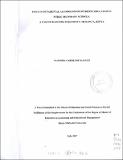| dc.description.abstract | ABSTRACT
The purpose of this study was to find out the effects of parental alcoholism on students' education in public secondary schools in Kangema Sub-County, Murang'a County. The specific objectives were: to find the rate of alcohol prevalence in Kangema Sub-County, to investigate how parental alcoholism influences school attendance of students within the area of study, to find out how parental alcoholism influences students' learning motivation and to find out how parental alcoholism affects students' discipline in public secondary school. This research was guided by the social learning theory .The study employed a descriptive survey study. The total target population was 1877 students. The units of analysis were form three students, Head of Departments for guidance and counseling, and Discipline masters. The study adopted stratified sampling where the Sub-county was divided into three strata's in terms of boarding, day or mixed day/boarding. Simple random sampling was used to select 30%from each stratum. Therefore the sample size included 8 public secondary schools comprising of 245 students, 8 Heads of guidance and counseling departments and 8 Discipline Masters. The instrument for data collection was questionnaires. Quantitative data was analyzed using descriptive statistics such as mean, mode, median and standard deviation. The analyzed data was presented by use of tables, diagrams, graphs and charts. From the results of the findings, it was noted that the majority of the students were aware of a relative in their families who abused alcohol. They indicated that alcohol was more prevalent on the fathers as compared to the mothers. Others indicated that they were aware of some parents to their school mates who abused alcohol. The majority of the students recognized the fact that most families had a history of parental alcoholism. On the rating of parental alcoholism in the families, majority of the students felt that the rating was fifty percent. The findings showed that inability to pay school fees in time could have contributed to reduce teacher- student contact hours which affected performance of the children and therefore hindering achievement in their education. Majority of the respondents indicated that parental alcoholism was a major contributor to absenteeism of students from schools either directly or indirectly. Issues of financing education by parents came out conspicuously. It was found out that most parents did not prioritize payment of school fees, provision of personal effects, buying of supplementary books and setting aside out -of- pocket money for their children. This implied that many children ended up being sent away from school due to financial related factors while learning motivation of a majority of students especially those in boarding school was adversely affected. Their levels of concentration decreased and consequently their education was affected. Moreover it was found out that parents delegated a lot of domestic chores to their children especially the day scholars who ended up either being late or missing school altogether or dropping out of school. The research findings led to the conclusion that, alcoholic parents are passively involved in the education of their children in public secondary schools in Kangema Sub-County, Murang'a County-Kenya.
_, | en_US |

